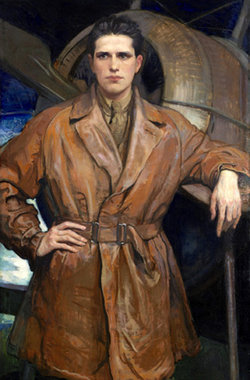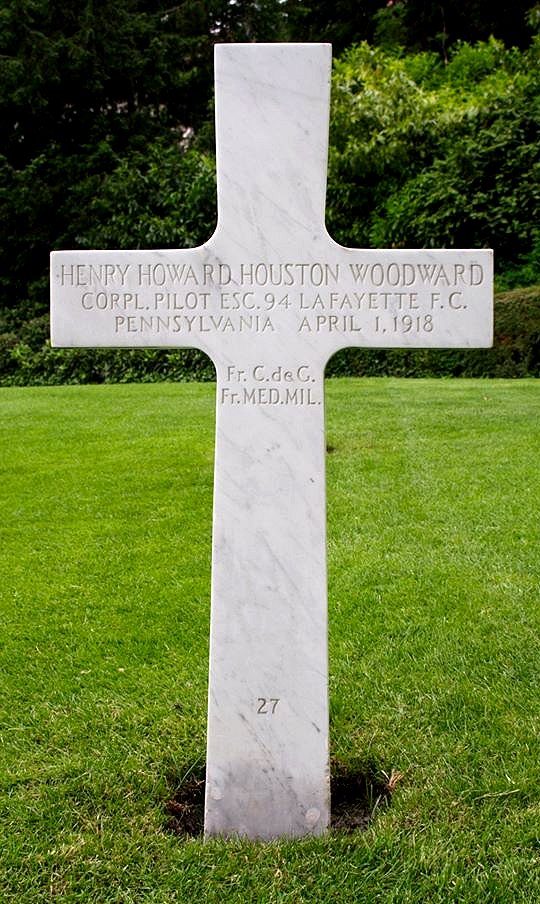HENRY H. HOUSTON WOODWARD, Caporal Pilote, Escadrille Spad 94, of the French Army was killed in combat, April 1, 1918. Having been sent out to patrol the enemy's lines on the afternoon of that day, he was seen several times by other members of the patrol during an attack made on some German planes, then disappeared. It was almost a year later that the remains of his charred Spad were located about three kilometers south of Montdidier, with a lone grave close by, marked with broken pieces of the plane. His brilliant sacrifice was the climax of a year's devotion to France and to the cause for which she fought.
Houston's military career began in his association with the Yale Battery of which he was an active member, and at Tobyhanna Camp, in 1916. In his sophomore year he resigned from Yale to enlist in the American Field Service, and sailed for France on February 19, 1917. He was sent to the front on March 31st, with Ambulance Section Thirteen, which was immediately attached to a French Division just going into line in the great Champagne offensive. Thus he served his novitiate in France in one of the most terrible battles of the war.
Tall, handsome, and of a remarkably winning personality, he made friends quickly in the Section. And as one of his fellow drivers writes: "When the section ran into very hard work during the offensive of Mont Cornillet, his friendships were cemented by a very great admiration for the tremendous and untiring energy and zeal which he devoted with all his soul to the performance of his duty as an ambulance driver and which enabled him to accomplish so much more than the rest of us. His courage, which appeared at times to amount to rashness, was in reality prompted by a desire to throw everything he had into his work without thought of reserving himself."
It was this same desire which urged him as the summer wore on to turn his thoughts toward aviation. Here he felt would be an opportunity to give his all unstintingly, and on July 24, 1917, he enlisted in the Aviation Service of the French Army, with which he had thus far served. He was assigned to the French Training School at Avord, Cher, France, and later to Juvisy, made rapid progress as a flyer, and was breveted on October 1, 1917. Then followed a period of further training at Avord and Pau, to perfect himself in the art of flying, and in December he was sent to the front with Spad Escadrille 94
His life, from then until his death, was full to the brim of the things which counted most for him. Good companionship and friends, the joy of combat, and most important of all, a work for which he felt himself admirably suited in a cause which he knew was just. As to the quality of the work he did, one of his comrades in the Escadrille states he was a most daring aviator, thoroughly skillful in the mastery of his plane and courageous almost to the point of recklessness. He was given official recognition for the descent of one German plane in a posthumous citation for the Croix de Guerre with palm.
One need not touch here on the heartbreaking suspense which his family and friends were forced to undergo after the news of his disappearance, and before it could be definitely established whether he had been killed in battle or was perhaps lying, badly wounded, in some German prison camp. What we do know is this,---Houston Woodward died, as he had lived and fought, a gentleman in word and deed, and a hero in the annals of his country.
HENRY H. HOUSTON WOODWARD, Caporal Pilote, Escadrille Spad 94, of the French Army was killed in combat, April 1, 1918. Having been sent out to patrol the enemy's lines on the afternoon of that day, he was seen several times by other members of the patrol during an attack made on some German planes, then disappeared. It was almost a year later that the remains of his charred Spad were located about three kilometers south of Montdidier, with a lone grave close by, marked with broken pieces of the plane. His brilliant sacrifice was the climax of a year's devotion to France and to the cause for which she fought.
Houston's military career began in his association with the Yale Battery of which he was an active member, and at Tobyhanna Camp, in 1916. In his sophomore year he resigned from Yale to enlist in the American Field Service, and sailed for France on February 19, 1917. He was sent to the front on March 31st, with Ambulance Section Thirteen, which was immediately attached to a French Division just going into line in the great Champagne offensive. Thus he served his novitiate in France in one of the most terrible battles of the war.
Tall, handsome, and of a remarkably winning personality, he made friends quickly in the Section. And as one of his fellow drivers writes: "When the section ran into very hard work during the offensive of Mont Cornillet, his friendships were cemented by a very great admiration for the tremendous and untiring energy and zeal which he devoted with all his soul to the performance of his duty as an ambulance driver and which enabled him to accomplish so much more than the rest of us. His courage, which appeared at times to amount to rashness, was in reality prompted by a desire to throw everything he had into his work without thought of reserving himself."
It was this same desire which urged him as the summer wore on to turn his thoughts toward aviation. Here he felt would be an opportunity to give his all unstintingly, and on July 24, 1917, he enlisted in the Aviation Service of the French Army, with which he had thus far served. He was assigned to the French Training School at Avord, Cher, France, and later to Juvisy, made rapid progress as a flyer, and was breveted on October 1, 1917. Then followed a period of further training at Avord and Pau, to perfect himself in the art of flying, and in December he was sent to the front with Spad Escadrille 94
His life, from then until his death, was full to the brim of the things which counted most for him. Good companionship and friends, the joy of combat, and most important of all, a work for which he felt himself admirably suited in a cause which he knew was just. As to the quality of the work he did, one of his comrades in the Escadrille states he was a most daring aviator, thoroughly skillful in the mastery of his plane and courageous almost to the point of recklessness. He was given official recognition for the descent of one German plane in a posthumous citation for the Croix de Guerre with palm.
One need not touch here on the heartbreaking suspense which his family and friends were forced to undergo after the news of his disappearance, and before it could be definitely established whether he had been killed in battle or was perhaps lying, badly wounded, in some German prison camp. What we do know is this,---Houston Woodward died, as he had lived and fought, a gentleman in word and deed, and a hero in the annals of his country.
Sponsored by Ancestry
Advertisement
Advertisement




